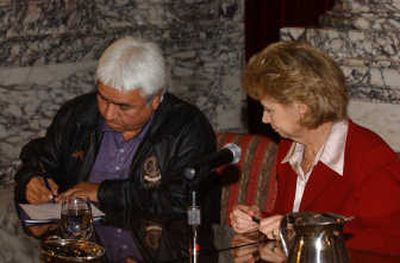State to pay tribes in water agreement

OLYMPIA – Gov. Chris Gregoire on Monday signed a multimillion-dollar agreement with the Confederated Tribes of the Colville Reservation that offers parched sections of Eastern Washington something that cities and farmers have sought for years: new water.
“This is a tremendous milestone,” Gregoire said, flanked by tribal leaders at a signing ceremony at the Capitol.
“It’s been a lot of work and many years, and here we are today,” Colville Tribal Chairman Mike Marchand said.
In exchange for annual payments from the state, the Colvilles agreed to not oppose the state’s plan to annually tap as much as 43 billion gallons more of water from Lake Roosevelt. At most, the lake level will drop by a foot at certain times of year, the state predicts.
Richard Sherwood, chairman of the Spokane Tribe of Indians, said his tribe is likely to sign a similar document. There are still some legal details pending, he said, adding that the tribe and governor have an agreement in principle.
Pending legislative approval, the state would pay a total of $6 million annually to the two tribes. The water is intended for Moses Lake-area irrigators struggling with an aquifer plummeting 7 feet a year, as well as other farmers, Eastern Washington cities and fish.
“Today’s historic agreement ensures a water supply that sustains farming, supports growing communities and enhances our precious salmon resource,” Gregoire said.
Some water experts were less enthusiastic. The agreement is “a short-term Band-Aid for a long-term problem,” said Andy Dunau with Spokane-based Lake Roosevelt Forum.
“Is this the end of water requests for Lake Roosevelt?” Dunau said. “That’s the unanswerable question.”
Rachael Paschal Osborn, executive director of the Center for Environmental Law and Policy, said the group is opposed to drawing any more water from the reservoir. There’s no extra now, she said. And government should have no obligation to bail out irrigators who’ve been draining reservoirs for decades, she said.
Gregoire said the cost of the agreement pales in comparison to the benefits to water users who have long needed new water supplies in as many as six counties. Loss of irrigation water in the area now served by the rapidly dropping Odessa aquifer threatens $600 million a year in farm revenues and 7,500 jobs, she said.
Jay Manning, head of the state Department of Ecology, said the agreements were the cheapest of several alternatives the state considered for freeing up more water in the area.
Grand Coulee Dam – which holds back the Columbia River waters that comprise Lake Roosevelt – inundated tribal rivers and uplands, said Sherwood. If signed, he said, the agreement “will provide major benefits downstream while helping the tribe to address some of the impacts from storage and use of that water on our lands,” Sherwood said.
But Manning and Sherwood both stressed that the tribes are not selling their water. They simply agreed not to oppose the additional drawdown.
Gregoire said she’ll ask state lawmakers to approve the agreement as well as payments to the tribes. The Spokanes would get $2.25 million a year; the Colvilles would get $3.8 million the first year and $3.6 million thereafter.
The tribes will use the money to help mitigate damage to fish and wildlife habitat, recreation and cultural activities resulting from the release of the additional water from the reservoir. The money can also be used for economic development, which is what Marchand said the Colvilles are likely to do.
Gregoire said she’ll also ask lawmakers to set aside $2 million for local governments around the lake “to address priority water issues.”
New water permits could be issued as soon as spring, according to Gregoire. The East Columbia Basin Irrigation District will work with farmers to deliver the new water to farms that now irrigate with groundwater.
Osborn argues that there are smarter alternatives. Some farmers could revert to dryland crops, she said. Or conservation efforts elsewhere in the irrigation system could result in water to be transferred to the struggling area.
“We have to accept this is just about one of the driest spots in the state,” she said, “and importing water to this area just may not be a good idea.”